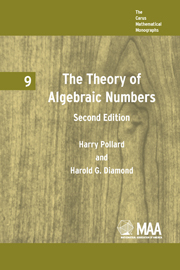Book contents
- Frontmatter
- Dedication
- Contents
- Preface to First Edition
- CHAPTER I Divisibility
- CHAPTER II The Gaussian Primes
- CHAPTER III Polynomials over a field
- CHAPTER IV Algebraic Number Fields
- CHAPTER V Bases
- CHAPTER VI Algebraic Integers and Integral Bases
- CHAPTER VII Arithmetic in Algebraic Number Fields
- CHAPTER VIII The Fundamental Theorem of Ideal Theory
- CHAPTER IX Consequences of the Fundamental Theorem
- CHAPTER X Ideal Classes and Class Numbers
- CHAPTER XI The Fermat Conjecture
- References
- List of Symbols
- Index
CHAPTER II - The Gaussian Primes
- Frontmatter
- Dedication
- Contents
- Preface to First Edition
- CHAPTER I Divisibility
- CHAPTER II The Gaussian Primes
- CHAPTER III Polynomials over a field
- CHAPTER IV Algebraic Number Fields
- CHAPTER V Bases
- CHAPTER VI Algebraic Integers and Integral Bases
- CHAPTER VII Arithmetic in Algebraic Number Fields
- CHAPTER VIII The Fundamental Theorem of Ideal Theory
- CHAPTER IX Consequences of the Fundamental Theorem
- CHAPTER X Ideal Classes and Class Numbers
- CHAPTER XI The Fermat Conjecture
- References
- List of Symbols
- Index
Summary
Rational and Gaussian primes. It is not difficult to establish the existence of an infinite number of rational primes—that is, primes in J. The simplest proof, due to Euclid, goes as follows. Suppose p1, p2, …, pn are known to be prime. Then the number N = 1 + p1p2 … pn cannot have any one of the Pi as a factor, since then 1 would also have that pi as a factor. Then any prime factor of N is different from p1, …, pn. This means that if any finite set of prime numbers is given, there is a prime different from any of them; so there are an infinite number if there is at least one. But 2 is a prime, and the conclusion follows.
Precisely the same proof is valid for Gaussian primes provided only that we can find one prime. But 3 has already been shown to be a Gaussian prime, so that G contains an infinity of primes. We can accomplish considerably more: we shall characterize explicitly all the primes in G in terms of those in J. In order to achieve this we shall need some material from elementary number theory. Actually we shall prove somewhat more than we need for the present purpose. The additional results will find application later.
Congruences. In this section we deal only with rational integers.
- Type
- Chapter
- Information
- The Theory of Algebraic Numbers , pp. 14 - 24Publisher: Mathematical Association of AmericaPrint publication year: 1975



